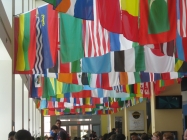
English speakers have an easier time adjusting to campus
UMBC gives a warm welcome to many international students, but can do more for those who aren’t fluent in English.
UMBC boasts about the number of international students here, believing that such representation makes it an international community where all types of cultures and languages are integrated. Approximately 800 of the students at UMBC are international students, coming from as many as 150 countries.
However, UMBC cannot call itself a truly integrated community until people of all backgrounds, cultures and languages spend time together, learning about and talking about each other’s cultures.
All students must have a basic grasp of English to be accepted into the university. This knowledge of English makes it easier for these students to integrate into our culture and community because they already have a grasp of it. For students who have more difficulty with the language, there is more of a difficulty to integrate.
But for all the students, whether they speak English or not, comfort dictates that these students mainly associate with people more like them — those from the same country and culture. Ryan Williams, the international student advisor, said, “perhaps UMBC, even though very diverse, is not as successful in having different cultures interact with those outside of their own cultural group.”
When walking past the English Language Institute, you notice the groups of students divided by original language and culture, and you hear a flurry of different languages. Very rarely is there a large group of people from many cultures speaking together. This divide shows that UMBC is not a true international community. For these students, talking amongst themselves is easier.
Olsi Leika, a junior computer engineering major, who is from Albania, speaks English well. He said, “I felt very welcomed at UMBC. Ryan and Michelle from the International Education Services office on campus were great. I attended an international orientation week, and it was wonderful. I got to know campus and Baltimore much better.”
Leika said, “there are a lot of events the IES office organizes throughout the year for international students, and I have been to a few of them. These programs are for all international students, whether they speak English well or not.”
But if these events are exclusively for international students, they do not focus on integrating students among the larger community, they reinforce separate groups. For these events to truly work, they need to focus on bringing international students and American students together.
There should to be more events and programs for all students focusing on learning about the different cultures represented at UMBC. International students should be encouraged more to get involved in student life and other groups of students on campus. UMBC should be encouraging students to not only teach English to those students at the ELI, but also learn other languages from international students.
The entire UMBC community would benefit if there were other programs to facilitate the integration and comfort of these students. In order for UMBC to truly be the international community that it prides itself on being, they need to work harder to bring together students of all cultures in one conglomerate, united campus.
Photo Credit: Aviva Zapinksy
Read more stories from: The Retriever Weekly





